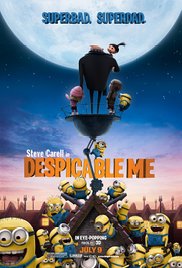 When it comes to filmmaking, there are multiple types of chemistry. The one most often discussed is the chemistry between actors; when it’s good, it can make good movies great and even unwatchable movies tolerable (say, Jennifer Aniston and Adam Sandler in “Just Go With It”), but when it’s bad, it will consume all living things on the screen (Jennifer Aniston and every other co-star she’s had in the last 10 years in movies not named “Horrible Bosses”). The other, arguably more important bit of chemistry involves story lines. 2011’s “Despicable Me” was about 45% villain plot, 45% foster parent plot, and 10% minions. Now, of course, the minions are stars, so they get more screen time in “Despicable Me 2.” And the movie suffers because of it.
When it comes to filmmaking, there are multiple types of chemistry. The one most often discussed is the chemistry between actors; when it’s good, it can make good movies great and even unwatchable movies tolerable (say, Jennifer Aniston and Adam Sandler in “Just Go With It”), but when it’s bad, it will consume all living things on the screen (Jennifer Aniston and every other co-star she’s had in the last 10 years in movies not named “Horrible Bosses”). The other, arguably more important bit of chemistry involves story lines. 2011’s “Despicable Me” was about 45% villain plot, 45% foster parent plot, and 10% minions. Now, of course, the minions are stars, so they get more screen time in “Despicable Me 2.” And the movie suffers because of it.
That’s not the only reason the movie suffers, mind you; the villain story isn’t as compelling, they lean really hard on the bathroom jokes (the “dart” gun from the first movie makes multiple appearances here), and for a movie that is supposed to have a mystery angle to it, everyone hides in plain sight.
Gru (Steve Carell) has quit villainy in order to be a good father to adopted daughters Margo (Miranda Cosgrove), Edith (Dana Gaier), and Agnes (Elsie Kate Fisher), but he is soon recruited by the Anti-Villain League, due to his expertise as a bad guy, to track down a new super-villain who has stolen a serum that turns its subjects into indestructible monsters. The AVL tracks the serum to a local mall, and Gru, with the help of AVL agent Lucy Wilde (Kristen Wiig), go undercover to find out which merchant is hiding the serum. The girls, meanwhile, want a mom, and pressure Gru into dating, while Margo falls for a boy, something Gru is not remotely prepared to handle in a way that doesn’t involve the words “Freeze ray!”
It makes sense that filmmakers would want to make age-appropriate versions of genres that are not kid-friendly, but between this and “Cars 2,” it’s clear that spy thrillers should be left off the table. It’s extremely difficult to challenge both adult and child with a whodunit; if anything, they will likely insult one or confuse the other, and if the studio is forced to choose, the parents are always going to be out of luck. The ‘secret identity’ part of the villain story left a trail of bread crumbs for kids to follow, and the emotional core of the movie (i.e. the girls) is marginalized in favor of the minions. The minions are cute, sure, but there is more to moviemaking than rolling out the walking punch line every few minutes. Based on the first “Despicable Me,” the filmmakers clearly know this; they just took the easy route this time around.
It was nice to see Wiig return, though (she was the head of the orphanage in the first movie), and she nails Lucy’s combination of naiveté and spy badassery. Carell doesn’t get a ton of chances to do something really funny, but he makes the most of his opportunities. The bit where the villain shows off the indestructibility of his serum is the funniest scene in the movie, and there is a circular shot towards the end where Gru is fighting off an army of bad guys that looks better than most live action movies from the last couple years. (My wife would also like to add that she loved seeing middle sister Edith acting like a full-blown tomboy. Apparently, that’s a middle sister thing.) You can see the makings of something better in fits and starts; it just can’t keep its momentum.
Universal had a golden opportunity here to hit Pixar while they were reeling and gain significant ground in the ridiculously competitive animation market, but “Despicable Me 2” does not land the punch. It feels as it Hal from marketing had some input in the creative process. This is never a good thing, and worse, the next installment in the series is actually called “Minions.” The tail is now officially wagging the dog.
 (2.5 / 5)
(2.5 / 5)





 (3.5 / 5)
(3.5 / 5)

 (4 / 5)
(4 / 5)



 (3 / 5)
(3 / 5)


 (2 / 5)
(2 / 5)

